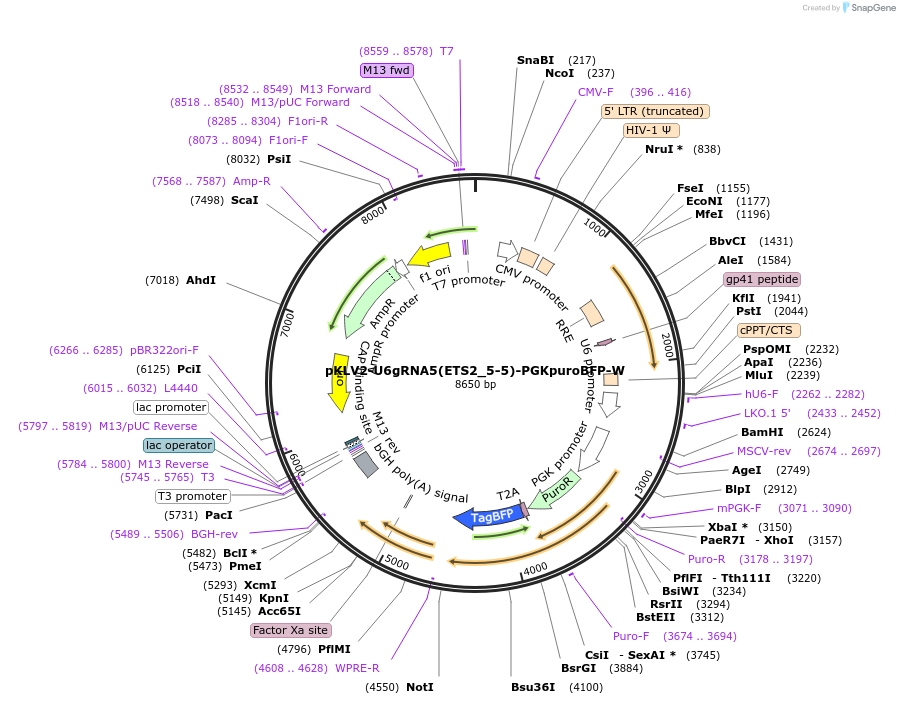pKLV2-U6gRNA5(ETS2_5-5)-PGKpuroBFP-W
(Plasmid
#211959)
-
PurposeExpress gRNA against ETS2 with puro and BFP
-
Depositing Lab
-
Sequence Information
Ordering
| Item | Catalog # | Description | Quantity | Price (USD) | |
|---|---|---|---|---|---|
| Plasmid | 211959 | Standard format: Plasmid sent in bacteria as agar stab | 1 | $89 | |
Backbone
-
Vector backbonepKLV2-U6gRNA5(BbsI)-PGKpuroBFP-W
- Backbone size w/o insert (bp) 8630
- Total vector size (bp) 8650
-
Vector typeMammalian Expression, Lentiviral, CRISPR
-
Selectable markersPuromycin
Growth in Bacteria
-
Bacterial Resistance(s)Ampicillin, 100 μg/mL
-
Growth Temperature37°C
-
Growth Strain(s)NEB Stable
-
Copy numberHigh Copy
Gene/Insert
-
Gene/Insert namesgRNA targeting ETS2
-
gRNA/shRNA sequenceCACAGAATTACCCCAAAGG
-
SpeciesH. sapiens (human)
-
GenBank IDNM_005239.6
-
Entrez GeneETS2 (a.k.a. ETS2IT1)
- Promoter Human U6 promoter
Cloning Information
- Cloning method Restriction Enzyme
- 5′ cloning site BbsI (destroyed during cloning)
- 3′ cloning site BbsI (destroyed during cloning)
- 5′ sequencing primer AGATAATTAGAATTAATTTGACTG
- (Common Sequencing Primers)
Terms and Licenses
-
Academic/Nonprofit Terms
-
Industry Terms
- Not Available to Industry
Trademarks:
- Zeocin® is an InvivoGen trademark.
These plasmids were created by your colleagues. Please acknowledge the Principal Investigator, cite the article in which the plasmids were described, and include Addgene in the Materials and Methods of your future publications.
-
For your Materials & Methods section:
pKLV2-U6gRNA5(ETS2_5-5)-PGKpuroBFP-W was a gift from Kosuke Yusa (Addgene plasmid # 211959 ; http://n2t.net/addgene:211959 ; RRID:Addgene_211959) -
For your References section:
RENGE infers gene regulatory networks using time-series single-cell RNA-seq data with CRISPR perturbations. Ishikawa M, Sugino S, Masuda Y, Tarumoto Y, Seto Y, Taniyama N, Wagai F, Yamauchi Y, Kojima Y, Kiryu H, Yusa K, Eiraku M, Mochizuki A. Commun Biol. 2023 Dec 28;6(1):1290. doi: 10.1038/s42003-023-05594-4. 10.1038/s42003-023-05594-4 PubMed 38155269



